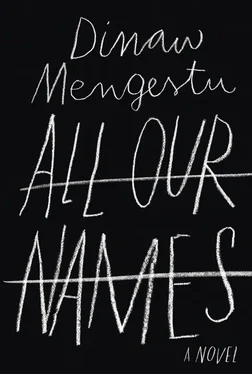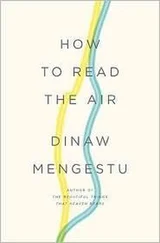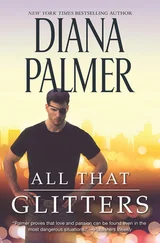“Colonel,” he said.
I was more relieved than surprised to find Isaac with his hands on the railing looking down at me. He was a colonel, a captain, or why not a general? Surviving was enough to have earned him that. We waved to each other — a simple thing that felt extraordinary, and I wished that we could have held that gesture for just a while longer, the way families and lovers did at bus stations and airports, whether someone was coming or going.
Isaac motioned with his hand for me to come up and join him. After a morning spent working on a mass grave, I felt I needed to stand on solid ground to make sure that I wasn’t sinking, too. I showed him the bloodstained palms of my hands, and waved for him to come to me.
The only source of water in the hotel was a manual pump in the rear of the courtyard. Isaac met me there as I was filling a small bucket to wash myself with. He handed me a bar of soap, and the first thing he said to me was “Be careful with that. It might be the only one left in the hotel.”
Before I dipped my hands into the water, Isaac told me to wait.
“Your hair is filthy,” he said. “Lean forward.”
I leaned my head next to the bucket, and Isaac poured water from a plastic pitcher over my head, then rubbed the soap deep into my scalp before rinsing it again.
“Now hold out your hands,” he said. I stretched out my arms with my palms facing up. He laughed. “This isn’t Europe,” he said. “How much water do you think we have?”
He cupped my palms for me and slowly poured a handful of water into them so I could rinse off the blood before properly washing them. By the time I finished, there was a line of men waiting behind me. “Give me a few minutes,” Isaac said.
I stepped to the side so the next man could take my place. Isaac washed his hands and hair as well. He did the same for a dozen men, until that last bar of soap was reduced to a nub no larger than the tip of a finger. He took what was left of the soap and rubbed it into his own hands until it had completely dissolved, and then rubbed his hands over his face. He washed himself with what little water was left in the bucket, and when he was finished, there were still streaks of soap along his right cheek.
“How do I look?” he asked me.
“Tired,” I said. “And you missed a spot.”
He rubbed the side of his face with his lapel, which was the one part of his uniform that didn’t have an obvious coat of dirt on it.
“I was worried that you would come back here,” he said.
“Where else was I going to go?”
“It didn’t matter; any other place would have been better.”
“I wasn’t planning on staying long.”
“Good. By tomorrow morning, there won’t be much left.”
Isaac took three fingers of my right hand in his. We walked out of the courtyard like that, and continued to hold hands until we reached the tree behind which the dead soldiers were buried.
“Why were they buried here?” I asked him.
He nodded to the hotel across the street. “The soldiers wanted it. They said their souls would never sleep after what they did if we buried them in the other village, and maybe they’re right.”
He saw me staring past him toward the grave, but he mistook my concern for pity.
“Don’t feel bad for them,” he said. “At least you helped bury them.”
He walked to the other side of the tree and stood on top of the grave. I thought he was going to spit on it, but instead he dug the heel of his right boot into the mound of earth as deep as he could.
“What happened?” I asked him.
He pretended to ignore the question, focusing his efforts on pressing his foot deeper into the ground. After several minutes, he finally responded. “Why would you want to know more?”
I didn’t have an answer, so I chose the one I thought he would want to hear. I pulled out the notebook he had given me. So far, I had filled six pages — four with a map, two more with half-finished sentences — but only I knew that.
“If you’re going to write something, write something nice,” he said. “Something that will make people happy. No one needs to read this.”
He began to dig with his other foot. I let him do so for several minutes before interrupting to ask him the same question again: “What happened?” Or maybe the second time I said, “Tell me what happened.” Either way, it wasn’t the right question. The “what” was obvious. What I didn’t know was what Isaac had done.
He kicked a mound of dirt into my hair without looking up at me. I took a few steps back, but that still didn’t feel far enough, so I walked around his left side until I was standing several feet directly behind him. I tried again.
“Did you kill anyone?” I asked him.
I watched his right leg take a long swing back and then abruptly stop just before it hit the ground.
“That’s a stupid question,” he said. “If you want to know, you should ask how many.”
“How many?”
“No. ‘How many people did you kill?’ ”
“How many people did you kill?”
“I don’t know,” he said. “More than I can count. Too many.”
I waited for him to turn around, but he didn’t. He kept his gaze firmly fixed on the tree in front of him as he made a few more stabs into the ground.
“Ask me how we killed them,” he said.
“How did you kill them?”
“We didn’t shoot them.”
“You cut them.”
“Yes. We beat them. We burned them. We had no bullets left. Ask me if we buried them.”
“Did you bury them?”
“No. We left them for the vultures and dogs. And then we ran back here so we wouldn’t have to look at what we had done.”
His right foot was buried past his ankle. I understood now why he was doing that.
“How deep is this hole?” he asked me.
“Not very deep,” I said.
He pulled his foot out of the ground and shook the dirt from his shoes.
“Good,” he said. “It’s already more than they deserve.”
We set our sights on the Hancock Center and aimed straight for it. Isaac watched the city through my window, while I found it hard not to stare at the lake out of his. This was still the Midwest, but it didn’t have the hard, firm earth that was supposed to come with it. The city ended abruptly, rather than trailing off into open fields like Laurel. This bothered me. I knew Isaac didn’t see it that way, so I kept silent as we traced our way along the shoreline, past the center of the city, and around a tight bend. I followed the heaviest traffic onto Michigan Avenue, where we met the Hancock Center head-on. Isaac leaned against the dashboard to get a better look. It was all wonderful to him. He saw the great possibilities buildings like that promised, especially to men like him, who had no idea what it meant to scale them.
We parked three blocks away from the tower he admired so much. Once we were out of the car, I told him to lead the way.
“This is your parade,” I said. He smiled. He had no idea what that meant. “It’s my turn to follow you now,” I explained.
Neither of us knew where we were. We had only the Hancock to orient us, and so of course Isaac retraced our route back to it. “I want to touch it,” he said, as if this was a confession of a desire he was embarrassed about. I imagined a surface slick and oily against my hand, one that would linger for a long time.
“Then let’s touch it,” I said.
The distance on foot was greater than I thought. The blocks were long. The sidewalks were more like roads, wide and crowded; it felt dangerous to walk down them. While Isaac looked up, I watched the faces that passed us. We weren’t holding hands, but we were standing close to each other. When Isaac caught something that fascinated him, he turned to me so I could share it with him. There were gargoyles, moldings, spires, and strange etchings on the sides of buildings, all of which could be seen if you walked with your head turned up. It wasn’t just buildings, though. There was an antique red roadster parked across the street that he wanted me to see, and a fountain; every beggar we passed demanded his attention, but not his curiosity. I looked wherever he told me and just as quickly looked to see the reaction of whoever was near us. As far as I could tell, no one had noticed us. I thought this was what it felt like to be invisible, but when I subtracted Isaac I realized that, until he came along, this was how I had always felt. Not invisible, but a natural part of the background, entitled to all the privileges that came with ownership.
Читать дальше












